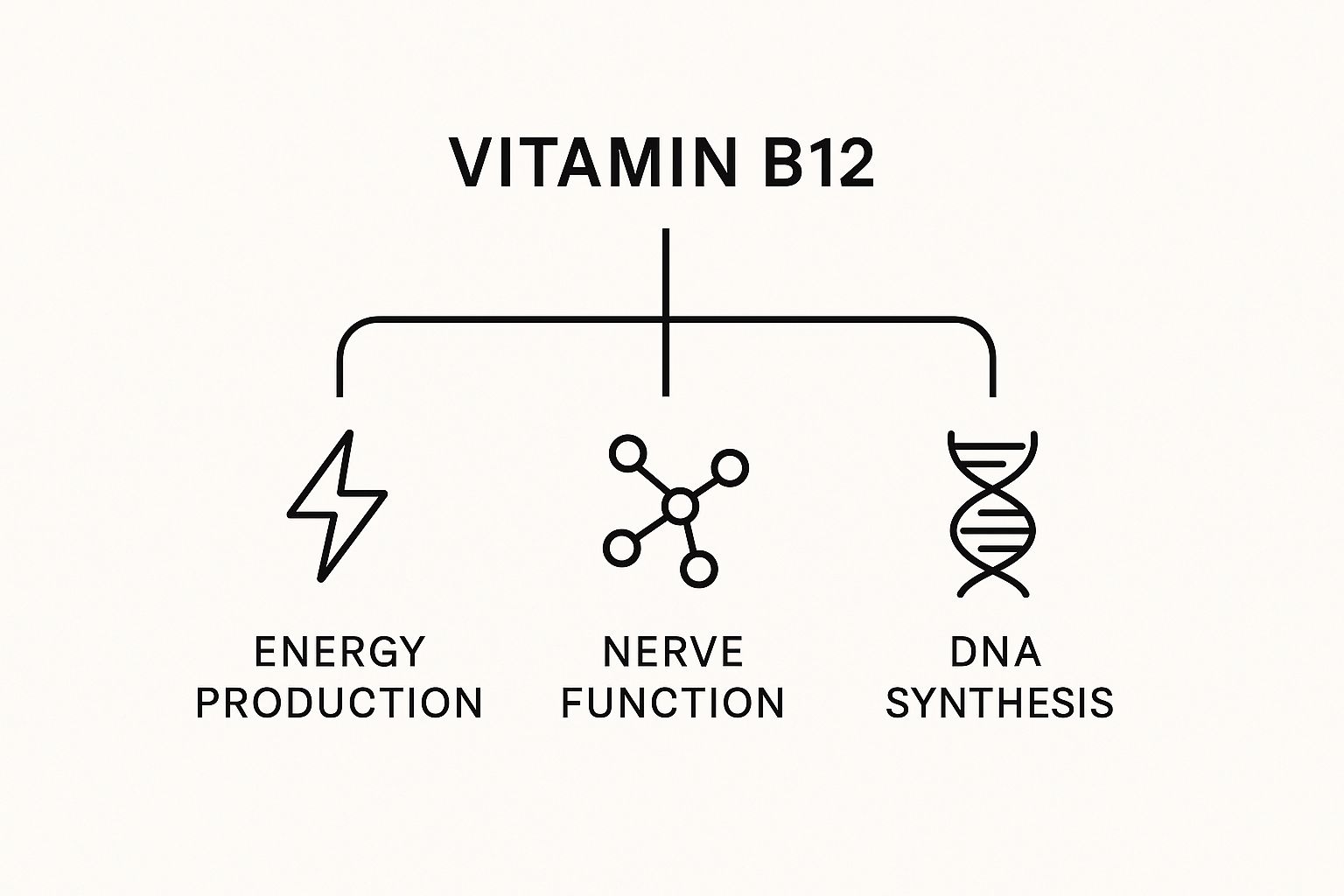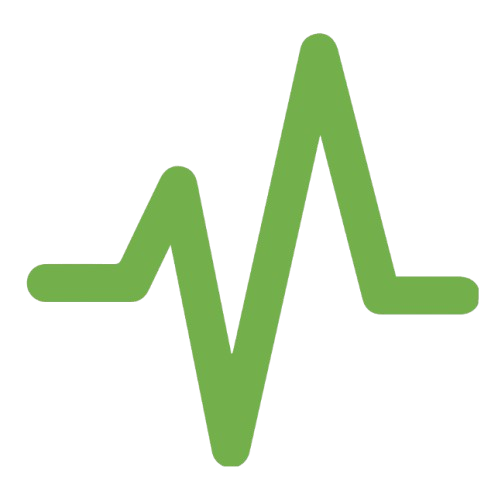
Recognize Vitamin B12 Deficiency Signs Early
Share
Ever feel constantly drained, a bit forgetful, or get those strange pins-and-needles sensations? It’s easy to brush these off as signs of a hectic life, but they could be your body's way of flagging up vitamin B12 deficiency signs. This isn't just a minor nutrient; it's a cornerstone of your well-being, and when your levels dip, you can feel the effects from head to toe.
This article is for informational purposes only and is not medical advice. Always consult a qualified health professional before starting any new supplement or major lifestyle change.
What Is Vitamin B12 Deficiency and Why Does It Matter?
Think of vitamin B12 as the behind-the-scenes manager for your body's most critical operations. It’s absolutely vital for producing energy, keeping your nervous system healthy, and synthesising the DNA needed to make new cells. A deficiency happens when you either don’t get enough B12 from your diet or your body struggles to absorb it, causing these fundamental processes to stutter.
And this isn't some rare, obscure issue. Here in the UK, it's estimated to affect about 6% of people under 60. That number jumps to a surprising 20% for those over 60. It’s far more common than you might think, with symptoms that are easily mistaken for the general wear and tear of ageing or stress. You can find more on the prevalence from in-depth population studies.
The Core Functions of Vitamin B12
To really get why a deficiency is such a big deal, you need to see what B12 actually does day-to-day. Its responsibilities are massive and all interconnected, making it a true powerhouse nutrient. If you're curious about how it works alongside its siblings, take a look at our guide on what the vitamin B complex is good for.
The infographic below neatly breaks down its three main jobs.

As you can see, it all clicks into place. A shortfall in B12 can directly lead to crushing fatigue (from poor energy production), nerve symptoms like numbness (due to impaired nerve function), and even anaemia (from faulty new cell creation). Understanding these links is the first step to spotting the signs and finding a solution.
What Are the Most Common Signs of Vitamin B12 Deficiency?
Because vitamin B12 is a true workhorse, involved in so many different jobs around the body, running low on it can trigger a surprisingly wide array of symptoms. Often, these signs are subtle at first and all too easy to brush off as just being a bit run down.
Learning to spot these early clues is the best way to tackle a deficiency before it leads to more serious problems. The symptoms generally fall into three main camps, which makes them a bit easier to get a handle on.

Neurological and Cognitive Changes
Your entire nervous system relies on B12 to keep the protective coating around your nerves—the myelin sheath—in good working order. You can think of it like the plastic insulation on an electrical cable. If that insulation gets worn away, the signals get crossed, weakened, or lost entirely.
This breakdown can lead to some of the most distinct red flags for B12 deficiency:
- Pins and Needles: A strange tingling or numbness that often pops up in the hands and feet. The medical term is paraesthesia, but most of us just know it as that annoying pins-and-needles feeling.
- Balance Issues: Feeling wobbly or unsteady on your feet is a common sign. You might find yourself struggling to walk in a straight line or just feeling generally clumsy.
- Brain Fog: If you’re constantly struggling to remember things, find the right word, or just focus on a task, it could be a sign your brain isn't getting the B12 it needs to function properly.
Physical Signs and Fatigue
One of the most common complaints is a deep, relentless fatigue that no amount of sleep seems to fix. This bone-deep weariness happens because B12 is absolutely essential for making healthy red blood cells, the tiny oxygen taxis that deliver fuel to your muscles and organs.
When your B12 levels drop, your body starts producing large, immature, and ineffective red blood cells. This condition, called megaloblastic anaemia, essentially starves your tissues of oxygen, leaving you feeling constantly exhausted and weak.
Other physical signs to watch out for include:
- Pale or Jaundiced Skin: Without enough healthy red blood cells, your skin can lose its colour, appearing unusually pale. Sometimes, it can even take on a slight yellow tinge (jaundice).
- A Sore, Red Tongue: Known as glossitis, this can make your tongue look swollen, smooth, and oddly beefy-red.
- Shortness of Breath: When your blood can't carry enough oxygen, your body tries to compensate by making you breathe faster and harder, even with minimal exertion.
To give you a clearer picture, here’s a quick breakdown of the key signs you might notice.
Key Vitamin B12 Deficiency Signs at a Glance
This table helps categorise the diverse symptoms of B12 deficiency, making it easier to spot potential signs you might be experiencing.
| Symptom Category | Common Signs |
|---|---|
| Neurological & Cognitive | Pins and needles (paraesthesia), balance problems, brain fog, memory loss. |
| Physical | Extreme fatigue, weakness, pale or jaundiced skin, sore red tongue (glossitis). |
| Psychological & Mood | Unexplained irritability, increased anxiety, feelings of depression. |
Hopefully, seeing them laid out like this helps connect the dots if you’ve been feeling “off” in several ways.
Psychological and Mood Shifts
The knock-on effect on your nervous system can also mess with your mental wellbeing. Unexplained mood changes are often missed but can be a clear signal that something’s amiss with your B12 levels.
These shifts might show up as sudden irritability for no apparent reason, a spike in anxiety, or feelings of depression that don't seem linked to anything going on in your life.
This deep-seated fatigue and its toll on daily life is a frequent struggle for many. If exhaustion is getting the better of you, our guide on the best supplements for fatigue might offer some useful insights. Getting your B12 levels back on track is a fundamental step towards feeling like yourself again.
Uncovering the Root Causes of B12 Deficiency
Spotting the signs of a vitamin B12 deficiency is the first step, but figuring out why it’s happening is the key to getting your levels back on track for good. While a diet low in B12 is a common culprit, it’s far from the only reason you might be running low. In many cases, the problem is hidden deep within your body's own chemistry.

Often, the issue isn’t a lack of B12 coming in, but a problem with how it's absorbed. Think of it like a lock and key. Your body needs a special protein made in the stomach called intrinsic factor to act as the "key." This key unlocks the door for B12 to pass from your gut into your bloodstream. Without it, the B12 simply can’t get in.
Pernicious Anaemia and Other Absorption Issues
The most frequent reason for this "missing key" in the UK is an autoimmune condition known as pernicious anaemia. This is where the body’s immune system mistakenly attacks the very stomach cells that produce intrinsic factor, leading to a serious deficiency even if you're eating plenty of B12.
Pernicious anaemia is the leading cause of severe vitamin B12 deficiency in the UK, especially affecting older adults. It's estimated that around 20% of people over 60 experience some degree of deficiency, highlighting why it’s so important to look beyond diet alone.
Other conditions can also throw a spanner in the works:
- Gut Health Conditions: Inflammatory bowel diseases like Crohn's or coeliac disease can damage the part of the small intestine where B12 is absorbed, blocking its entry into your system.
- Stomach Surgeries: Procedures like a gastric bypass can shrink the stomach's capacity to produce both acid and intrinsic factor, drastically reducing B12 absorption.
Dietary Choices and Medication Impacts
Of course, what you eat still plays a massive part. B12 is found almost exclusively in animal products, so people following vegan or strict vegetarian diets are at a much greater risk of deficiency and need to rely on fortified foods or supplements to keep their levels up. In fact, some studies show a deficiency rate of around 11% among vegans. You can find more insights into B12 deficiency causes from the NHS.
Finally, it's worth knowing that some common medications can interfere with B12. Long-term use of drugs like metformin for diabetes or proton pump inhibitors (PPIs) for acid reflux can lower stomach acid, which makes it much harder for your body to release and process B12 from your food.
Understanding Who Is Most at Risk
While a vitamin B12 deficiency can technically happen to anyone, some of us are far more likely to run into it. Your age, diet, and certain health conditions can seriously ramp up your risk. Knowing where you stand is the first step in staying ahead of any potential problems.
One of the biggest groups at risk? Older adults. It’s a simple fact of ageing: our stomachs tend to produce less of the acid needed to pry B12 away from the protein in our food. Even if you’re eating plenty of B12-rich meals, your body might struggle to actually absorb it without enough stomach acid to kickstart the process.
Dietary and Lifestyle Factors
What you eat (or don’t eat) plays a massive role. Since vitamin B12 is found almost exclusively in animal products—think meat, fish, eggs, and dairy—anyone on a plant-based diet needs to be extra vigilant. This is especially true for those following strict vegan and vegetarian diets, where getting enough B12 means leaning on fortified foods or taking a reliable supplement.
Other key groups who need to keep B12 on their radar include:
- Individuals with Gastrointestinal Conditions: If you have something like Crohn's or coeliac disease, the chronic gut inflammation can damage the very part of your intestine responsible for absorbing B12.
- People Who Have Had Stomach Surgery: Procedures like a gastric bypass physically alter your digestive system, which can limit both stomach acid and the production of a crucial protein B12 needs to be absorbed.
- Long-Term Medication Users: A few common prescriptions can interfere with B12 absorption over time. Metformin (for diabetes) and proton pump inhibitors, or PPIs (for acid reflux), are two of the most well-known culprits.
By figuring out which, if any, of these groups you fall into, you can have a much more productive chat with your doctor. It’s all about knowing your personal risk so you can decide if getting tested is a sensible next step.
How to Get a Definitive Diagnosis
If you're reading this and nodding along, connecting your own symptoms to the potential vitamin B12 deficiency signs we've covered, the next step is getting a proper diagnosis from a healthcare professional. This usually kicks off with a simple blood test ordered by your GP, but knowing what the results actually mean is where things can get a bit tricky.
The standard test measures your total B12 level in the blood. While it's a good starting point, it has its limits because it can't tell the difference between "active" B12 (the stuff your body can actually use) and the "inactive" form. This means your results could fall within the "normal" range, yet you're still struggling with symptoms. That’s why precise testing is so important, and services offering convenient blood tests at home can make getting those answers much simpler.
Beyond the Standard Blood Test
Because of the blind spots in the standard test, your doctor might suggest digging a little deeper to get the full picture. These more advanced tests don't just count the B12 in your blood; they look at what your body is doing with it on a functional level.
Some of the key follow-up tests include:
- Active B12 (Holotranscobalamin): This is the one you really want. It specifically measures the B12 that's attached to its transport protein, ready and available for your cells to use. Many experts consider it a far more accurate marker of a true deficiency.
- Homocysteine and MMA: Think of these as warning flags. They are substances that build up in your blood when your B12 levels are too low to process them properly. High levels of methylmalonic acid (MMA) and homocysteine are strong functional indicators that you have a deficiency.
Interpreting Your Results with Your Doctor
Getting a clear diagnosis can be a challenge simply because that first-line test measures total B12, not just the usable, active part. A clinical deficiency is often pretty clear-cut at levels below 133 pmol/L, but there can be a huge grey area above that.
It's particularly a concern for older adults, with over 10% of those over 75 affected. Armed with this knowledge, you can have a much more productive conversation with your GP about your symptoms and test results.
Getting Back on Track: B12 Treatment and Prevention
The good news is that once a B12 deficiency is flagged, getting your levels back up to scratch is usually quite straightforward. The right game plan really depends on why you’re deficient in the first place—is it a gap in your diet, or is your body struggling to absorb the nutrient?

For anyone with absorption issues, like pernicious anaemia or certain gut conditions, medical treatment is the only way forward. This almost always means a course of B12 injections, which in the UK is typically hydroxocobalamin.
Your doctor will likely start you on what’s called a "loading dose." Think of it as an intensive top-up, with frequent injections to quickly replenish your body's empty reserves. Once you're back in the healthy range, you’ll switch to maintenance jabs every few months to keep things stable.
Oral Supplements and Smart Eating
If your deficiency is purely down to your diet, high-dose oral supplements can work wonders. It turns out your body has a backup absorption route that kicks in when doses are high enough, bypassing the need for intrinsic factor. This makes tablets a fantastic and convenient option for many people. It's often helpful to see how different nutrients support each other; you can learn more about the partnership between an iron and B-12 supplement.
When it comes to long-term prevention, though, diet is king. Building sustainable eating habits is your best bet for getting all the nutrients you need, day in and day out.
A smart combination of treating any underlying issues while making clever dietary choices is the surest path to recovery and lasting health. Fixing a B12 deficiency can be genuinely life-changing, boosting your energy, sharpening your focus, and improving your overall sense of wellbeing.
To keep your B12 topped up the natural way, try to weave a variety of these foods into your weekly meals:
- Animal-Based Foods: Beef, liver, and chicken are B12 powerhouses. Fish like salmon and tuna are also packed with it, as are eggs and dairy products like milk, cheese, and yoghurt.
- Fortified Vegan Foods: If you follow a plant-based diet, fortified foods are your best friend. Keep an eye out for plant milks, breakfast cereals, and nutritional yeast that have B12 added to them—they provide a reliable source to meet your daily needs.
A good quality multivitamin can also act as a daily safety net, helping to fill any nutritional gaps and give your health a solid foundation.
Frequently Asked Questions
Got questions about B12 deficiency? Let's clear a few things up. Navigating the world of vitamins can throw up some practical queries, so here are some straightforward answers to the questions we hear most often.
How Long Does Recovery Take?
This really depends on how severe the deficiency was and how long you’ve been living with it. Many people start to feel a lift in their energy levels and notice the brain fog clearing within the first few weeks of treatment. It can be a huge relief.
Neurological symptoms, like that frustrating pins and needles feeling, are a bit more stubborn. They can take a good 6 to 12 months of consistent treatment to improve. It’s worth knowing that if the deficiency was particularly severe or went undiagnosed for a long time, some nerve damage can, unfortunately, be permanent.
Can I Get Enough B12 on a Vegan Diet?
Absolutely, but you need to be smart about it. Since vitamin B12 doesn’t naturally pop up in plant-based foods, you have to make a conscious effort to bring it to the table.
This means regularly eating B12-fortified foods like nutritional yeast, certain plant milks, and cereals. An even more reliable route is to take a daily B12 supplement. It's a simple and effective way to ensure you're getting what you need and keeping those deficiency signs at bay.
Are Vitamin B12 Supplements Safe?
For most of us, yes. B12 is a water-soluble vitamin, which is just a fancy way of saying your body takes what it needs and flushes out any extra through your urine. Because of this, there’s no official upper limit for how much you can take.
That said, it’s always a good idea to have a chat with a healthcare professional before starting any new supplement. They can look at your personal health picture and help you figure out the right dose and type for you.
Ready to take the next step in optimising your health? The experts at VitzAi.com can help you understand your unique nutritional needs with a personalised, AI-driven approach.
Discover your tailored supplement recommendations at https://vitzai.com.
This article is for informational purposes only and is not medical advice. Always consult a qualified health professional before starting any new supplement or major lifestyle change.
